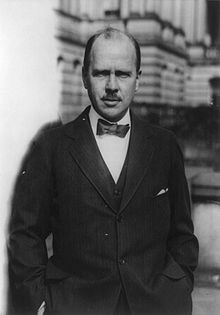Hugh R. Wilson
| Hugh Robert Wilson | |
|---|---|

1927
|
|
| Born | January 29, 1885 |
| Died | December 29, 1946 (aged 61) |
| Nationality | United States |
| Known for | Diplomat |
Hugh Robert Wilson (January 29, 1885 – December 29, 1946) was a member of the United States Foreign Service, who headed the U.S. mission to Switzerland for ten years beginning in 1927. He became Assistant Secretary of State in 1937 and served for several months in 1938 as U.S. Ambassador to Germany.
Wilson was born on January 29, 1885, in Evanston, Illinois, to Hugh Robert and Alice W. Wilson. He attended Yale University graduating in 1906. He worked in business for a few years and studied at the École Libre des Sciences Politiques, Paris in 1910. He served briefly in the U.S. delegation in Lisbon until, upon passing examinations for the Diplomatic Service, he was appointed Secretary to the U.S. delegation in Guatemala. While in that post, Wilson married Katherine Boyle in London on April 25, 1914. He later served in Buenos Aires, Berlin, Vienna, Tokyo, and Berne. From 1924 to 1927 he worked in Washington as Chief of the Division of Current Information of the U.S. Department of State.
He held the position of Envoy Extraordinary and Minister Plenipotentiary to Switzerland from 1927 to 1937, and during those years represented the United States at many international conferences. On August 23, 1937, he became Assistant Secretary of State. He served as U.S. Ambassador to Germany from March 3, 1938, to November 16, 1938.
He attended the congress of the Nazi Party in Nuremberg in September 1938, breaking with the precedent established by his predecessor, William E. Dodd, who had refused to attend. In Dodd's absence, the embassy's chargé d'affaires had attended the previous year. President Roosevelt called Wilson home for urgent consultations in November 1938 following the anti-Jewish attacks of Kristallnacht and he never returned to Germany.
Wilson coined the phrase "pretty good club" while describing the foreign service. When he was the ambassador to Germany he sought to emphasize the positive aspects of Nazi Germany. He accused the American press of being "Jewish controlled" and of singing a "hymn of hate while efforts are made over here to build a better future." He praised Hitler as the man who has pulled his people from moral and economic despair into the state of pride and evident prosperity they now enjoyed."
...
Wikipedia
